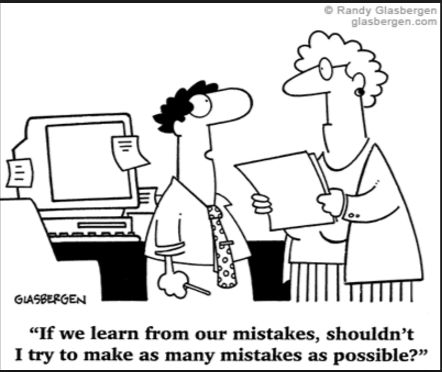
The online dictionary on my laptop defines a mistake as: “an action or judgment that is misguided or wrong”. If I even I think I’ve made a mistake I get a horrible sinking feeling in my stomach and I sudden desire to crawl under a rock – forever. Pretty awful stuff and I’m pretty sure how I feel is not unique. So, if making a mistake triggers such a strong reaction how can it be a good thing?
Here is a digital presentation from a previous student about how we can use turn mistakes into a positive learning experience.
Some of the points that resonated with me were:
- the importance of dealing with mistakes rationally and not emotionally. Getting lost in the emotion will block students from learning;
- create an environment that is open to students making mistakes. Praise effort, provide feedback, ditch the focus on perfectionism, teach responsibility and forget the whole blame game;
- encourage a growth mindset with students.
Carol Dweck, in her TED talk ‘ The Power of Yet’ speaks about how a growth mindset can transform students as it opens up the potential for achieving goals based on effort and dedication to learning. In other words, even if a student were to fail at the task provided at the moment, they focus on ways to learn so that they can experience success in the future – the power of yet. This is in contrast to the fixed mind set that is focused on what the student is able to achieve or not achieve at the moment. In the fixed mind set, a student feels compelled to maintain self-esteem by negating the failure present in the now by whatever means possible – like cheating for example.
One of the ways we as teachers can help to create a growth mind set is to focus on learning goals instead of performance goals. From this document Designing Environments to Support a Learning Goal Orientation comes this quote:
“A consistent finding from decades of research is that an environment that emphasizes a performance goal orientation (i.e., a focus on proving your ability) makes people more likely to give up after failure, whereas an environment that emphasizes a learning goal orientation (i.e., a focus on improving your ability) encourages people to persist in problem solving.” (para 1)
It also goes on to state that responses to mistakes with a learning goal orientation is to “Learn from mistakes” whereas the performance goal orientation has people “Avoid mistakes; deny or ruminate on mistakes” (table 2).
Orlando (2011) in his article Failure is an Option: Helping Students Learn from Mistakes discusses one instructor’s approach to creating a growth mindset in his students (para 4,5):
“. . . I asked him about his reputation as both the best and toughest teacher in the school. I made the comment that he must not give many A’s, but he responded by saying that everyone in his class gets an A.
I asked him how this could square with this reputation for toughness. He replied that when a student hands in a paper he is given comments and told to rewrite it, and must rewrite it over and over until it is an A-quality paper. Only then it is accepted.”
The focus in health care is about performance. Not surprisingly, clinicians are inclined to hide mistakes and are reluctant to admit errors. This not only creates distrust with patients it prevents learning from happening. Interestingly, when I run simulations and recreate the same events staff deal with in real life, and shift the focus to that of learning instead of performing, people readily share mistakes. Opening up creates a feelings trust, support and bonding between team members. It also creates a desire to keep learning until the team gets it right.
What about you? How have you been able to learn from mistakes either as a teacher or as a student?
As for me, I still have a lot of work to do so that I am able to move past my visceral response to making mistakes but I know that I will get there, I’m just not there yet.
References
Barber, N., (2013) On the Benefits of Failure Failure is nothing to be ashamed of! Psychology Today Retrieved from: https://www.psychologytoday.com/blog/the-human-beast/201302/the-benefits-failure
Designing Environments to Support a Learning Goal Orientation (n.d.) LCL 2013: Session 8 – Motivation Retrieved from https://llk.media.mit.edu/courses/readings/LCL_Motivation_Learning_Goals.pdf
Dweck, C. (2014) The Power of Yet TEDxNorrköping Retrieved from https://www.youtube.com/watch?v=J-swZaKN2Ic
Orlando, J. (2011) Failure is an Option: Helping Students Learn from Mistakes Faculty Focus Higher Ed Teaching Strategies from Magna Publications Retrieved from: http://www.facultyfocus.com/articles/teaching-and-learning/failure-is-an-option-helping-students-learn-from-mistakes/
